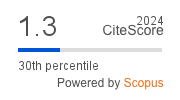Antibacterial ability of arabica (Coffea arabica) and robusta (Coffea canephora) coffee extract on Lactobacillus acidophilus
Downloads
Downloads
Worotitjan I. Pengalaman karies gigi serta pola makan dan minum pada anak sekolah dasar di desa Kiawa Kecamatan Kawangkoan Utara. Jurnal e-gigi 2013; 1(1): 59-68.
Quivey RG, Koo H, Seils J, Abranches J, Robert A, William H. Influence of Apigenin on gtf gene expression in Streptococcus mutans UA159. Antimicrobial agents and chemotherapy. J Microbiology 2006; 50(2): 542-6.
Sanders ME, Klaenhammert TR. The scientific basis of Lactobacillus acidophilus NCFM functionality as a probiotic. 2012. p. 319-31.
Fitrianti D, Noorhamdani, Setyawati S. Efektifitas ekstrak daun ceplukan sebagai antimikroba terhadap methicillin-resistant staphylococcus aureus in vitro. Jurnal Kedokteran Brawijaya, 2011; 26(4): 3.
Wang Y, Ho CT. Polyphenolic chemistry of tea and coffee: a century of progress. Journal of Agricultural and Food Chemistry 2009; 57: 8109-14.
Widyotomo S, Sri M. Ekstraksi kafein dari dalam biji kopi. Warta Pusat Penelitian Kopi dan Kakao Indonesia 2007; 22(3): 13-41.
Suhad AMS, Ekbal AK, Ali AS. Anti microbial investigation of Suaeda baccata (chenopodiaceae). J Plant Science 2004; 2(1): 49-51.
Farida A, Ristanti E, Kumoro AC. Penurunan kadar kafein dan asam total pada biji kopi robusta menggunakan teknologi fermentasi anaerob fakultatif dengan mikroba nopkor MZ-15. Jurnal Teknologi Kimia dan Industri 2013; 2(3): 70-5.
Baylin A, Hernandez-Diaz S, Kabagambe EK, SIles X, Campos H. Transient exposure to coffee as a trigger of a first nonfatal myocardial infarction. J Epidemiology 2006; 17(5): 506-11.
Namboodiripad A, Kori S. Can coffee prevent caries?. J Conserv Dent 2009; 12(1): 17-21.
Mardiyaningsih A, Aini R. Pengembangan potensi ekstrak daun pandan (Pandanus amaryllifolius Roxb) sebagai agen antibakteri. J Pharmaciana 2014; 4(2): 188.
Ayini U, Hanina S, Dewi TC. Efek Antibakteri ekstrak daun mimba (Azadirachta indica A. Juss) terhadap bakteri vibrio alganoliticus secara in vitro. Journal of Biology & Biology Education 2014; 6(1): 4-6.
Taguri T, Kouno TA. Antimicrobial activity of 10 different plant polyphenols against bacteria causing food borne disease. Biol Pharm Bull 2004; 27: 1965-9.
Quivey RG. Influence of apigenin on gtf gene expression in Streptococcus mutans UA159. Antimicrobial agents and chemotherapy 2006; 50(2): 542-6.
Mendez CR, Badet C, Yanez A, Domingue ML, Giono S, Richard B, Nancy J, Dorignac G. Identification of oral strains of Lactobacillus species isolated from Mexican and french children. Journal of Dentistry and Oral Hygiene 2009; 1(1): 9-16.
Nuhu A. Bioactive Micronutrient in coffee: recent analytical approaches for characterization and quantification. Nigeria: Hindawi Publishing Corporation ISRN Nutrition; 2013. p. 1-13.
Almeida AA, Farah A, Daniela AM, Elziria, Beatriz M. Antibacterial activity of coffee extracts and selected cofee chemichal compounds against Enterobacteria. J Agric Food Chem 2006; 54(23): 8738-43.
- Every manuscript submitted to must observe the policy and terms set by the Dental Journal (Majalah Kedokteran Gigi).
- Publication rights to manuscript content published by the Dental Journal (Majalah Kedokteran Gigi) is owned by the journal with the consent and approval of the author(s) concerned.
- Full texts of electronically published manuscripts can be accessed free of charge and used according to the license shown below.
- The Dental Journal (Majalah Kedokteran Gigi) is licensed under a Creative Commons Attribution-ShareAlike 4.0 International License

















